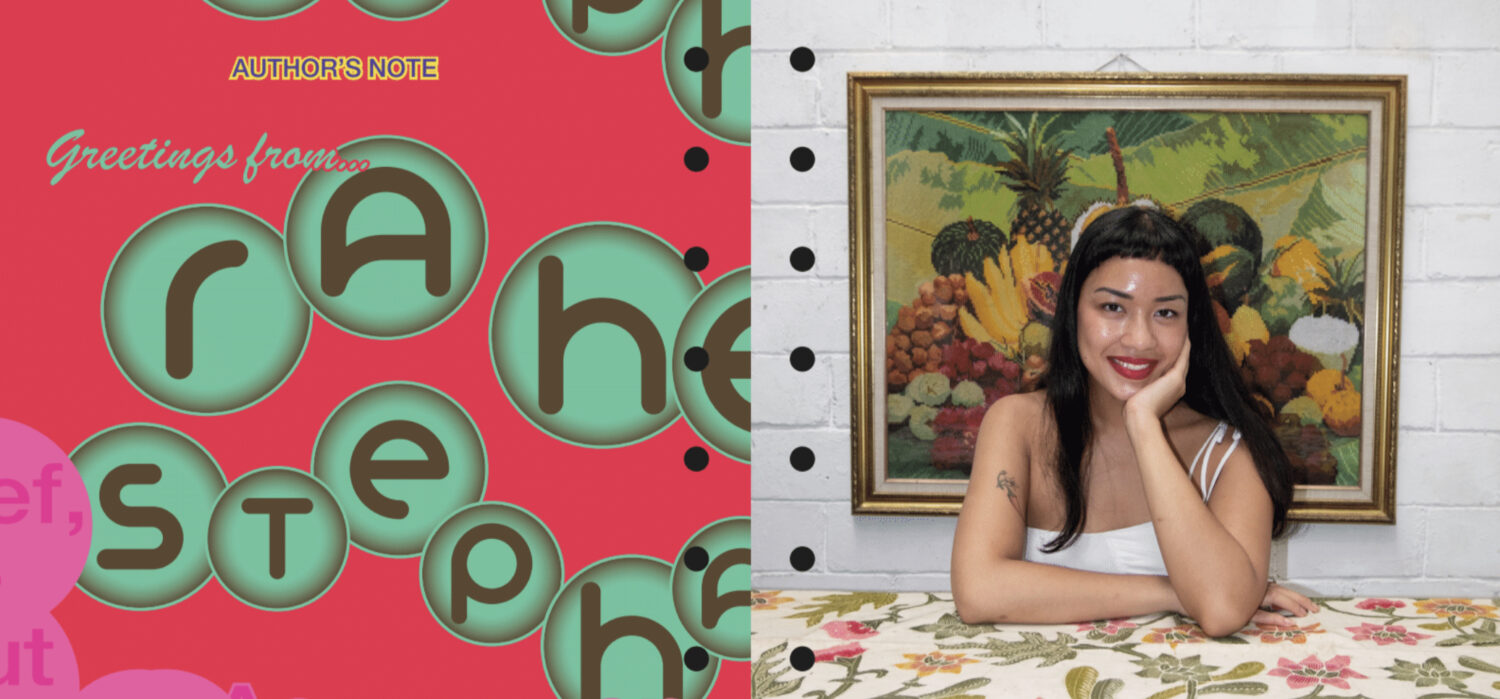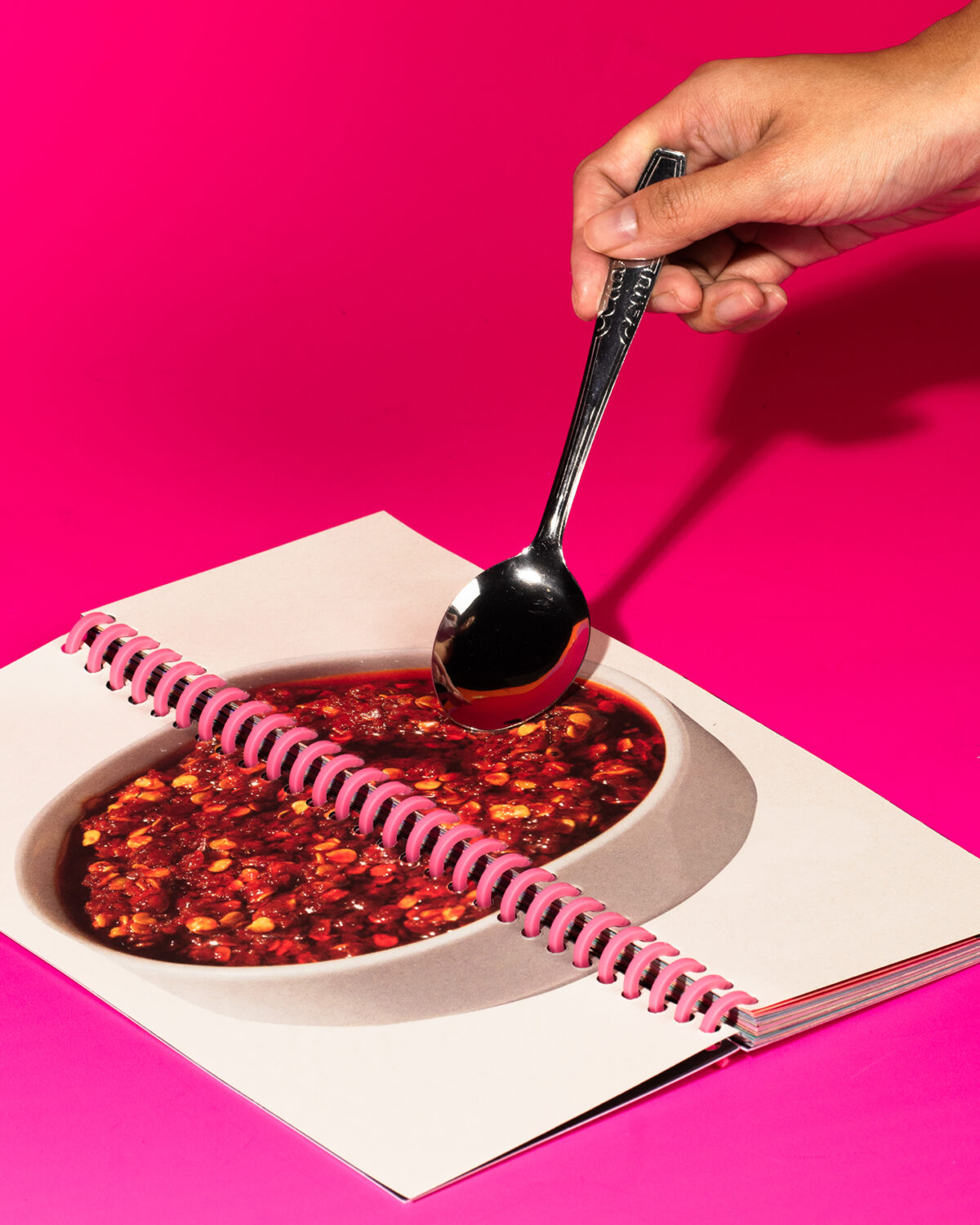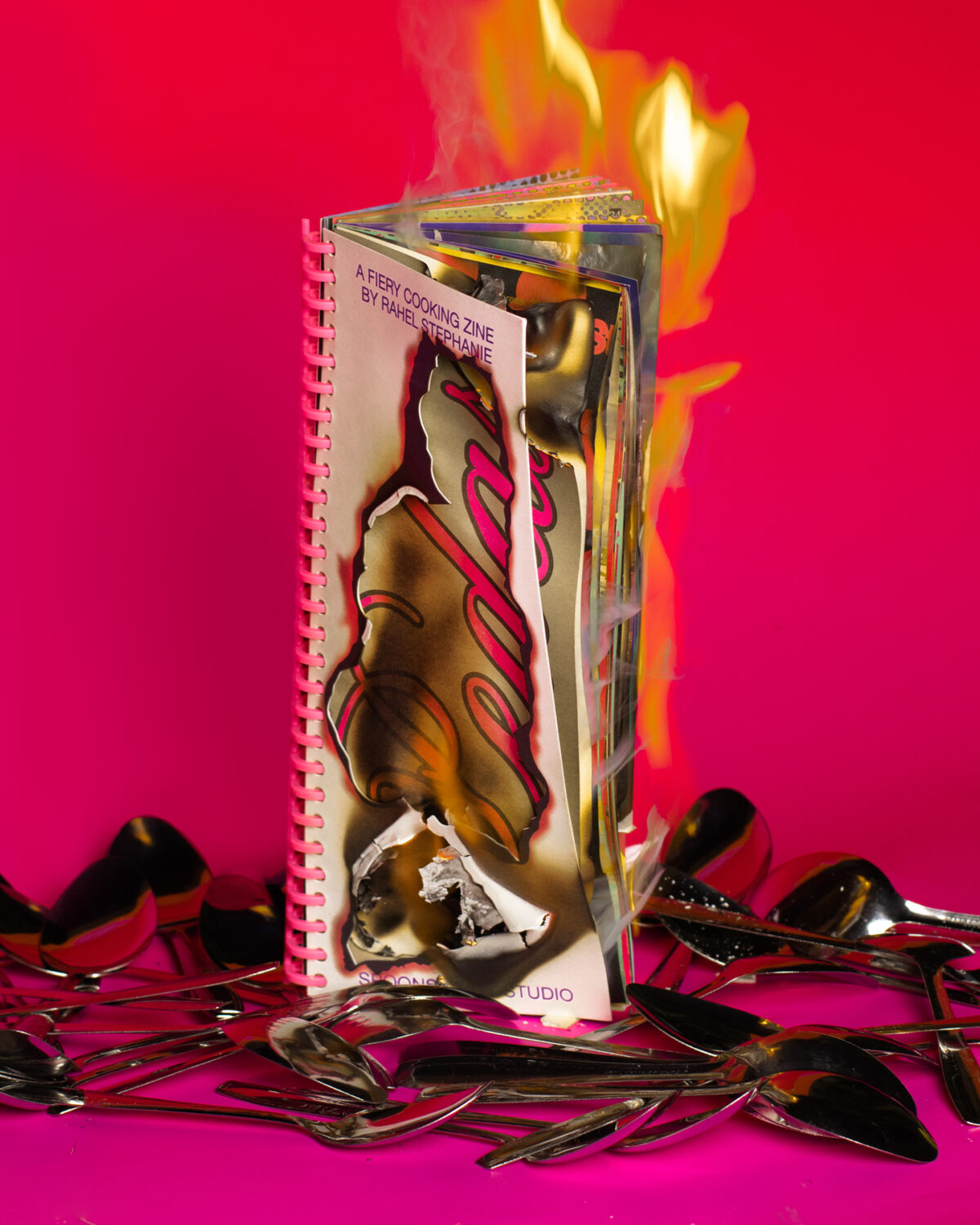Rahel Stephanie Wants to Tell You About Indonesian Food
By Adam CoghlanRahel Stephanie is the Indonesian, London-based chef and food writing sensation behind the pop up brand Spoons, which she created, somewhat by accident, in 2019. Since then, she has flown.
In April of this year, Stephanie released her debut zine, Pedas – a document devoted to the brand of Indonesian food culture she wants to share with her audience, all over the world. In the bright, maximalist style for which she is known, she publishes six recipes – (“Spicy recipes; it would be weird there was a recipe for roast potatoes,” she says) – alongside essays, art, and photography across nearly 100 pages.
Something Curated’s Adam Coghlan caught up with Stephanie in London this month to talk through her latest project, her brand, “Linda from Accounting,” spice, and what’s coming next.

Adam Coghlan
So tell me about Pedas, your new zine – the idea and how it came about?
Rahel Stephanie
So, the zine itself is a collaboration with a design studio based in Jakarta called Tiny Studios, run by a duo called Nadine Hanisya and Ratta Bill. They have been designing my flyers for all my events, supper clubs, pop ups, for the past two-to-three years, and so it just made sense to collaborate and create something that was completely on our own terms. They just get [what I’m doing] and we’ve had the same aesthetic vision since the beginning. The only brief I ever gave them was this random mood board filled with different visual inspiration – everything from street side menu design to food packaging and music posters… The only word that I gave them was “maximalist.” So anything not minimalist, because I’m so sick of that. They got it immediately and they’re really supportive of what I do through Spoons and food. There’s always been a synergy, so creating something Pedas is a physical manifestation of all our work we’ve done so far. It made a lot of sense. And that’s how it came about.
AC
What was the concept behind the zine and its design?
RS
So the zine is called Pedas, which means spicy in Indonesian. And I’m not saying that this is generally a big Indonesian phenomenon, but it’s more so about my own relationship with that word: spicy, I feel is quite intimidating to a lot of people, especially in the West. And as a woman or an Indonesian woman specifically – often similar kinds of characteristics to spicy food are put on us – being intimidating, when a woman could be forthright or just powerful. That inspired me to reclaim that, I guess.
It’s quite in line, I guess, with my brand, if you will. And the zine itself, we call it a “cooking zine”, but it’s not just that, since it’s got only six recipes in it. It’s over 90 pages or something, but only six recipes. So a lot of it takes you through the visual elements but also a lot of narratives. And while my practice personally, my main motivation is always about spreading awareness about Indonesian cuisine, this zine specifically isn’t necessarily a textbook or an educational book for people to learn about the history of Indonesia; it’s about my personal relationship with Indonesian food, specifically from the lens of a person who was born and grew up in Jakarta. So we take you through the street food culture, and the social cultures around food, how we go through this capital city environment.

AC
You mentioned your brand…about that, Linda from Accounting, your Instagram name. Please tell us about Linda?!
RS
[Laughs] A friend and I were coming up with what we imagined to be extremely boring characters or persona. I’ve had this handle for probably a decade and it’s just a meaningless joke that’s stuck on – I guess it’s catchy. It’s a little annoying that some people think I’m called Linda even though I’ve included my IG bio name as “Rahel not Linda” but whatever – it isn’t that deep, [laughs.]
AC
How many copies did you print? And where can we get it?
RS
So to start with, we had 550 copies. Yeah. 550 copies. And now I think we’ve got just 50 copies left with the distributor, so I’ve just requested a reprint. It’s done a lot better in that way than I had thought it would initially. I’ve never put out anything this on my own before and it was very intimidating so at first I really just wanted it to be 150 copies period, no reprints, nothing –
‘get it while you can’, but then the response with it has been so lovely, people have been really supportive, stockists have been extremely supportive. I didn’t even plan to stock it anywhere. You know, it was just meant to be kind of self-distributed. And so we went through one reprint and we’re doing another reprint right now. I should have just had some balls and that would have saved me costs from the printing. It was my first time, you know, it’s not a profit-making exercise.
RS
I work with Public Knowledge books, the distributor, and now it’s being stocked in places I would never even have thought, freaking Sacramento, LA – it’s global. Insane. It was definitely not in the game plan at all.
AC
Sacramento! Where else?
RS
So London, LA, Sacramento, New York, I think Copenhagen, Amsterdam. Those are some of the big ones and there’ll be more to come as well. I think we’re trying to get it out in Paris; there has been some interest in Australia too, and obviously Indonesia.
AC
Tell us about who else is involved, beyond Tiny Studio’s Ratta and Nadine.
RS
It’s all printed in Jakarta and designed in Jakarta. Everyone involved in the zine are Indonesians, which has been incredible. Sabrina Chitra edited the zine: she’s a very good friend of mine; an incredible writer as well. And so it was such a nice way to create something with people I really admire and value. Indonesian people specifically, which is something I haven’t been able to do before.

AC
What’s your background – and how did you arrive here, with Pedas?
RS
So I had never thought I’d ever find myself with a fully fledged career in food or hospitality or even write about things in general; I thought the extent of my writing would be my dissertation. But my pipeline was really random: I came to London to study fashion business and marketing. At that time, I was part-timing at an architecture firm because I didn’t want to work in fashion. But obviously I’m not an architect so I popped over to advertising and that’s where it killed it for me. And at the same time, I was always doing the supper club thing on the side just as a really casual side project to get friends and friends of friends together and share Indonesian food because I realised honestly people don’t know anything.
So it just started off as that. Then we went into the pandemic and into the lockdown, I converted from doing pop ups to home delivery meals. And I think that’s really where it grew quite organically and I was able to reach higher volumes of people and higher frequencies through a lot of word-of-mouth and yeah, I guess the rest is history. It was kind of by accident; there was no strategy behind it or anything; I just love food. The eating, not necessarily the chopping garlic part. I love having people over, sharing food, and spreading awareness about my culture and my heritage because that’s so important to me.
AC
Right, so many things!
RS
Yeah, a lot of things I guess. It was really: right time, right place. I still can’t believe it, it’s still so surreal. It’s crazy. My parents are like, ‘so you cook, but you don’t have a restaurant.’ And I say, ‘no!’ And I don’t intend to either.
AC
You’re on this sort of mad random journey – have you got any idea of what comes next?
RS
Honestly, eventually, I’d love to put out an actual book of my own. Because [Pedas] is just a small iteration of what that could look like.
AC
I want to ask about your creative influences, and who’s inspired you and your projects?
RS
In terms of food itself, I guess there’s always that really stereotypical story of being, ‘oh, yeah, I’ve watched my mom cook since I was three.’ That definitely wasn’t the case for me. All I know is I’ve always loved food. But really what I think got me extremely passionate about Indonesian food specifically is the classic story of moving to the other side of the world and realising your food isn’t … you know, Indonesian food barely existed here and I missed it very much so I had to learn how to cook it for myself.
And from there, I had to learn a lot through YouTube videos by housewives and Indonesian aunties, and honestly I’ve learned the most from them – more than anyone else. So they’re my biggest influences, I guess. Unpretentious; no bullshit cooking: I love that. Apart from that I guess there are some Indonesian cookbook authors that I really, really admire, for example, Sri Owen’s Indonesian Food is number one – in that she published the first Indonesian cookbook in the English language. So she’s up there for sure, she’s amazing.
But it’s interesting – now that I’ve got this keen interest in food, I’ve gone back to Indonesia and reconnected with a lot of my family members. And it’s that kind of a trajectory rather than starting off being inspired by the cooks in my family. Realising this coming back, when like last year my grandma passed away, that helped me also reconnect with her siblings, my granddad and everything: realising that there’s a lot that we’re mutually interested in. And not necessarily things that we’ve ever bonded over before. So yeah, it’s been really cool.

AC
It’s been a busy time for you, especially since the pandemic. What’s next?
RS
So I say that I try to do the pop up monthly, but um, my next project actually launching this month, is this crazy project I’m doing with Wagamama, which is probably the biggest project I’ve done, ever. We’ve developed a menu item, ayam geprek – “smashed chicken” – a Javanese battered fried chicken dish, smashed, and served on a bed of sambal. It’s so good. The sambal is a West Sumatran red tomato caramelised chilli relish, which we’re serving with some coconut rice and a turmeric slaw, so we’ll see how it goes!
It’s something I’m very nervous about. But you know, my biggest motivation is to keep spreading Indonesian cuisine, to get it out there. And I feel how else but using this mass market? They’ve not had any Indonesian food on their menu so far.
Pedas is available now and you can buy it here. Header image courtesy of Spoons and Tiny Studios. This interview has been edited for clarity.